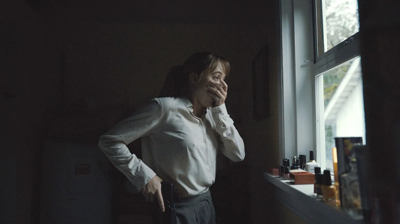One of the most satisfying cinematic experiences you can have is being completely overwhelmed with dread.
It’s not a uniquely cinematic experience; other mediums can provide a similar feeling. (I’m personally a big fan of sprawling crime novels wherein the detective descends into a metaphorical hell … an apt touchpoint for Longlegs.) But there's nothing quite like the feeling of sitting in a dark theater and becoming consumed by the anxiety of the action on screen, the walls slowly closing in on you. Longlegs captures that claustrophobic feeling better than any film has in years.
Director Osgood Perkins (the son of Psycho star Anthony Perkins, making this the second wide-release horror film in as many weeks with a direct connection to Hitchcock’s pioneering masterpiece) has long had an auteurist proclivity for rendering haunting images. But his films, though beautiful, are often inert. While not perfect, Longlegs avoids that problem; you’re hooked immediately, from the frightening opening scene.
The third installment in Ti West's horror franchise is now playing at the Belcourt and AMC and Regal theaters
Longlegs follows intuitive (bordering on psychic) FBI Agent Lee Harker, played by the millennial scream queen Maika Monroe, as she tracks down the demonic serial killer known as Longlegs, portrayed by Nicolas Cage. The film’s core quartet is inspired casting. Monroe brings her now-decade-long history of horror roles to the insular Harker, while Cage turns his freakazoid dial past the maximum. The lead cast is rounded out by a pair of underutilized (in film, at least) actors — Blair Underwood, playing Harker’s boss Agent Carter, and Nashville's own Alicia Witt, looking nearly unrecognizable as Harker’s mother Ruth. Monroe in particular helps bring the film’s anxious atmosphere off the screen. She is a balled fist of panic as she follows a rabbit hole into hell. Her run since It Follows — which also includes The Guest, Watcher, Significant Other and Villians — is enough to earn her first-ballot Horror Hall of Fame inductee status.
Longlegs is clearly inspired by other serial killer thrillers, namely Jonathan Demme’s Silence of the Lambs (a female FBI agent hunting down a serial killer who has an obsession with her) and David Fincher’s Seven (trying to crack the code of a theatrical serial killer). Like those films, Longlegs uses its titular serial killer sparingly. Cage’s minimal but impactful screen time makes Hannibal Lector and John Doe seem like full-fledged lead characters. But Longlegs isn’t aiming for the icon status of those art-pop classics. Its goal is something stranger, more off-kilter. At times, that can lead to a less traditionally satisfying story. But it also leads to some truly eerie sequences.
The film’s marketing campaign has been nothing short of masterful. It has highlighted critics’ and audiences’ reactions to the aforementioned frightening moments. I’m not sure you should head into the theater with the “Scariest Movie in Years” title in mind. (Hereditary's crown is safe.) Still, the film is genuinely unnerving — perhaps a harder feat than being outright terrifying.
Perkins directs the hell out of Longlegs, but you might leave the theater wondering what could have been if the script had been a bit more dynamic. This type of project doesn’t necessarily need a crackling script, but if Perkins’ direction and the lead performances had been paired with a slightly meatier story, Longlegs could have been in the same instant-classic territory as the movies it's modeled after.
Longlegs may fall a bit short of its lofty goals, but I left the theater planning a rewatch soon. It’s the best horror film of a horror-heavy year so far, and it's the type of movie that is bound to get even better on a subsequent viewings. Just don’t let the man downstairs get a hold of you.






